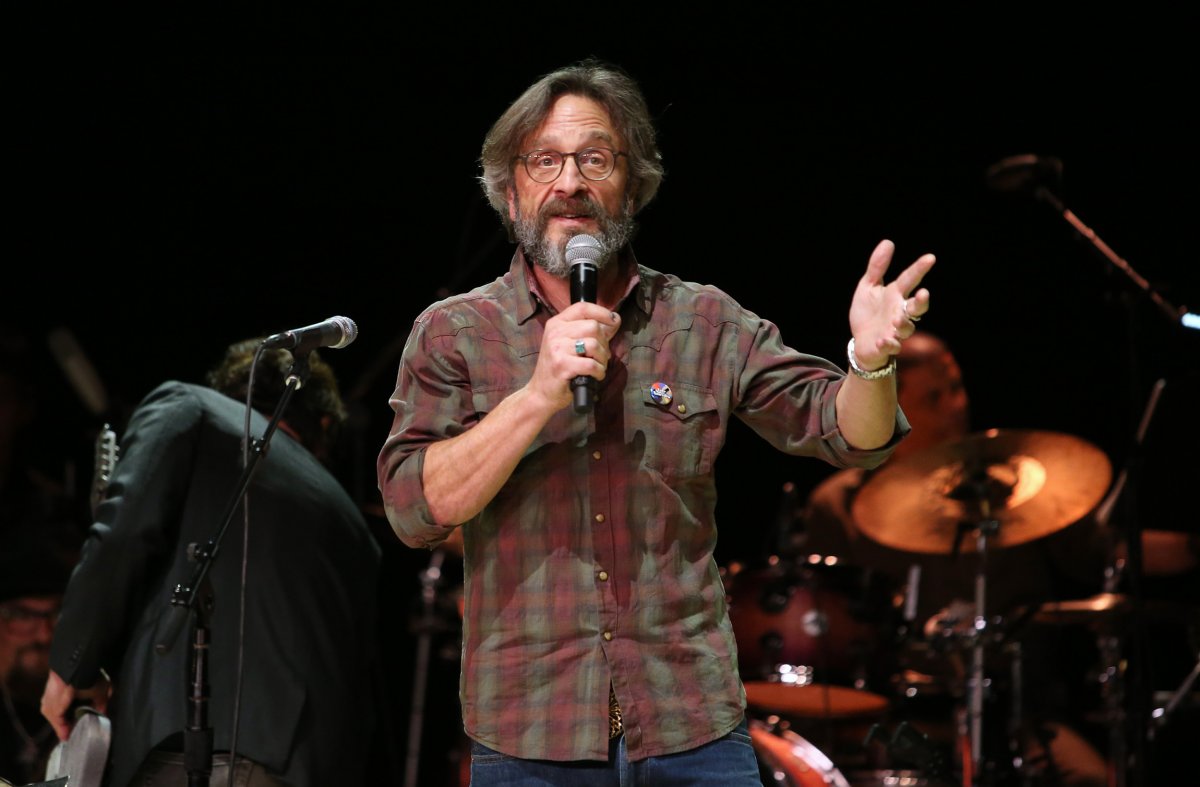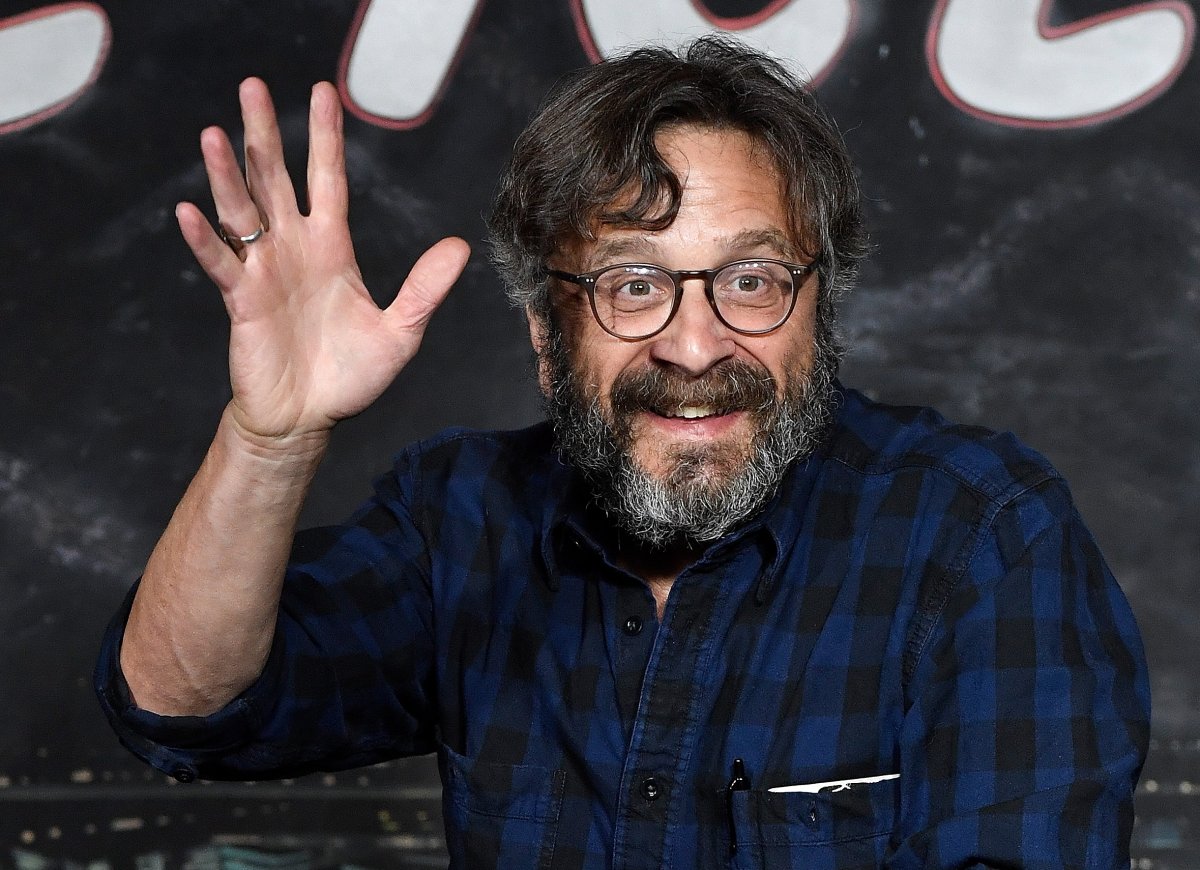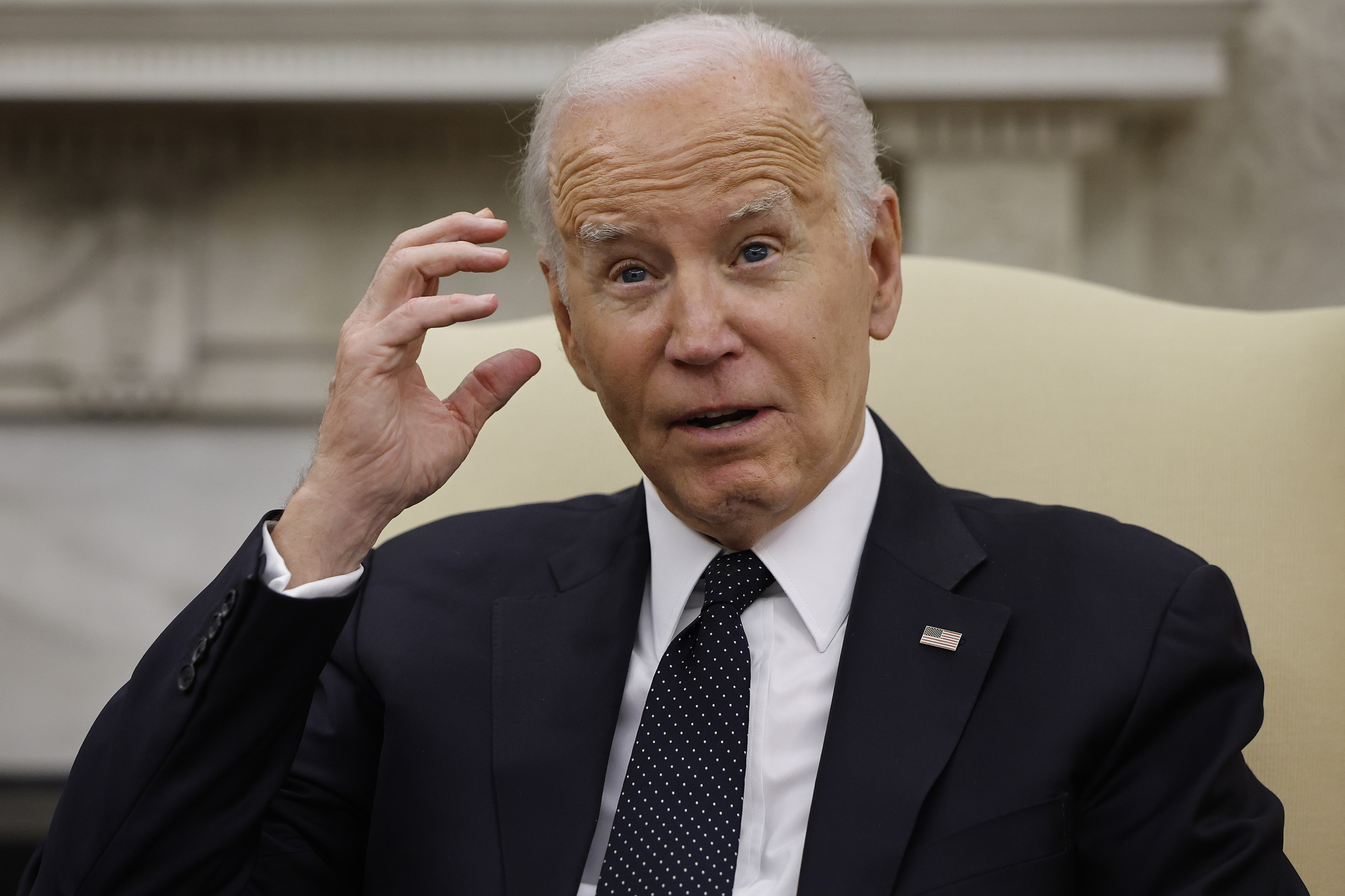What's the best way to brace for the end of the world? According to Marc Maron, maybe Iron Man will save you if you're a Marvel fan. But even though he might not really have the answer to that question, Maron's new Netflix special End Times Fun—which is streaming now—is a hilarious salve to some of the fears that many Americans have in 2020.
Despite hosting the massively successful podcast WTF with Marc Maron, acting in the Netflix hit GLOW and appearing in the Academy Award-winning film Joker, the 56-year-old comic has never lost his intense, self-deprecating honesty, or the often-cynical lens through which he views the world. In End Times Fun, Maron pokes fun at his own audience for thinking they're making a difference in the fight against environmental catastrophe. "All of us in our hearts really know that we did everything we could," he quips. "Think about it: We brought our own bags to the supermarket. Yeah, that's about it."
Over the course of End Times Fun, Maron points to the California fires, his mom feeding iguanas and the current presidential administration as signs of the apocalypse. "It's pretty clear the world is ending. I don't want to shock anybody," he says early in the special. "I thought we'd get out. I thought we'd make it under the wire... I think we might see it."
Maron spoke to Newsweek about humor acting as a release valve for fear, clashing with Marvel fans (who sometimes appear ready to bring down fire and brimstone) and trying to figure out what role entertainment plays in frightening times.

How was writing End Times Fun different from writing your previous special, 2017's Too Real? Does your process change from show to show?
No, actually, it's interesting. It doesn't really change, because it's sort of an ongoing process for me. I'm not one of these people that it's sort like I have to sit down and write a new hour. The jokes evolve onstage, and they evolve through repetition. Some stuff has been percolating for years in different forms and some stuff is part of this ongoing conversation I have. The process doesn't change. I think I worked some of this stuff longer and some of this stuff, not unlike Too Real, came together towards shortly before I filmed it.
What I liked to do for the last few specials is find a way to connect everything through callbacks or thematically. So it feels like an entire piece, and those things reveal themselves to me as I go along. For a long time, Iron Man wasn't even involved at the end of it. I don't know when that's going to happen, but I think that's the thrill of however I do it. That's what's exciting to me, the discovery of it over time, because it all happens onstage and in real time for the first time. It doesn't come off the page.
This special feels the most tied together and thematic more than any of your other more recent specials.
I think that's true. A couple years ago my tone—I think beginning with Too Real—shifted into an urge to panic. There was this justified fear rippling through those of us that are still alert enough to sense it. I think the thing worked. It came together. I think I presented it in a way that's entertaining. There's a sort of terrifying element to it all, but the trick of this special was presenting it in a way that's not going to make things worse for people mentally. I want to give some release.
This special is especially apocalyptic. Comedy has been a valve to release tension almost since its invention, but did you have any qualms about going hard into the apocalyptic content, given our current climate?
My comedy's always been aggressive. There was a period of time there for a couple of specials that I was really self-involved and I found that that was a very creative force for me. My biggest fear about talking about current events is not a fear of talking about them. It's about doing it in an original way. Also, really finding something that is going to hold up. You have to be careful in terms of your specificity around subject matter, because by the time it comes out, even two months later, it could be old news.
In terms of the apocalyptic thing: I've been pretty honest about my sense of panic and fear and I actually pulled back a little bit. There are pieces that I'm still working on now that didn't make the special, more specifically about authoritarianism and about other stuff, and it's funny, but I definitely was aware that there had to be release valves within this special.
When Too Real came out, you caught some backlash for opening the special with political jokes about Trump, but you told people to just get through the first seven minutes if they disagreed with you. You get more consistently political throughout this special—is this a direction you see yourself growing in?
I don't know. I've been there before. Doing this kind of stuff is not alien to me. I did political radio for years, for a couple of years anyway. If you look at one of the Comedy Central Presents that I did, probably 2006 or something. I've been in that wheelhouse before. I did pull away from it on purpose, specifically for the reason that, either side that you choose politically, eventually you're carrying water for ideas that aren't essentially yours. There's no way to circumvent or avoid the talking points and it becomes very hard to differentiate between your own opinions and what the momentum of your ideological beliefs are.
I intentionally got out of that to sort of find my own brain again. The way I got doing it now: It seems imperative to present an alternate way of thinking to the sort of fascistic momentum that's happening. It happened in many places over the course of fairly modern history, and I can't live with myself without figuring out a way to present my point of view and my fears, comedically. I think it'd be doing a disservice. It felt almost like a civic responsibility.
I don't know if I would call those right-wing critics of mine fans necessarily, though some of them were, but I do think there's an objectivity to the stuff in Too Real that it wasn't specifically ideological, it really was, again, about fear. I think in this one, it's rooted in fear, but it's more specific, and certainly the finale of the thing is kind of poised to upset or offend a lot of people, but if they appreciate the joke and stay with it all the way through, I think they should be able to put it all in perspective—but I doubt it.
You make fun of Marvel fans and movies a lot in this special. Did that inform your decision to act in a DC movie instead of Marvel?
[Laughs] It's weird about the Marvel fans. Y'know, I've been a little bit cranky about it. My opinions are valid, and the thing is that they'll react as if they're being victimized, but they are the dominant paradigm in culture now. You're not really punching down on nerd culture at this juncture. The problem is they react in the same victimized way, because they've got this territory, and they're certainly not going to give it up, and I get that.
I think still, the criticism is valid and I think in a weird way in the special, I kind of honor the comic book world more than attack it. I present my criticisms of it, but the throughline is kind of fun, and if they can't see the fantasy of it, then everybody is so dug in the tribal trenches that I don't know, maybe we just can't see—there's no possibility of us all being on the same page again.
In terms of the DC movie, I wouldn't have done that movie or a comic book movie—I wouldn't have sought it out, either of them, but I was asked to be in a movie with Robert De Niro and Joaquin Phoenix, and that was really what got me into the movie. I was asked to do it, and I was like, "What is it?" Todd [Philllips, the director of Joker] was like, "It's a Batman movie, but it's not going to be like a Batman movie. It's the Joker, and it's going to be more of a grazing, but you'd be in a scene with De Niro and Joaquin." I'm like, "That sounds amazing!" I'm not gonna pull out of that on principle.
It feels like—
Before you go on, I want to point out that all of those Marvel fans who got mad at me said that that movie would flop and that they wouldn't go see it, because of me, and clearly, it did not flop, and clearly, they all went to see it.
Do you think there's a toxicity to fandom or that fandom specifically?
Sure there is! Yeah, there's a toxicity to that kind of obsessive—I guess it's fandom—but yeah, because it's the same excitement that anyone has that chooses a side or picks a team or wears the outfit or shows up as a character. Whatever it is, I get the homage. I get the excitement around it. Once it becomes an "us or them" kind of thing, yeah, it's toxic.
It seems like so much of your work stems from cynicism. What's your process like to turn something cynical into something funny?
I guess I'm cynical. I have a hard time seeing myself sometimes, but I think the process of being cynical, of getting laughs with these type of darker sentiments, it's relieving. In the last few days, I've been doing some stuff around the coronavirus, because there's a type of laugh that comes from a recognition of a common fear. I think the relief of that is the reward of being able to make that kind of stuff funny. It's always a risk. You deal with this kind of stuff, a lot of people are not gonna think it's funny.
There is a real gear in me at this point in time that basically is yelling on some level, "Haven't we been entertained enough? At what point does that relent to some other type of conversation in terms of entertainment?" It's a very strange thing in this country in particular about the persistence of the entertainment industry, and what is it really doing? There is part of my brain that is always thinking, "Yeah, I'm gonna be entertaining. I'm gonna be engaging at the very least, but I'm gonna try to say something here, because I've got the stage."
Has acting in GLOW and Joker affected the way that you write material?
I don't think it's affected the way that I do standup. I think the podcast has, because I'm able to talk through things in an improvisational way. I do stream-of-consciousness on the podcast. So, things come up that I find interesting, and I expand on them in my standup. The only thing that I think is different is that people that don't necessarily know my standup come to see me, and I don't know what that experience is for them. If you're a podcast fan, you know me pretty well. If you saw me in Joker, but you don't know my podcast or my comedy, it's all going to be surprising, but if you know me from GLOW and you like that show and you come to my comedy without knowing my podcast or my past is comedy, I imagine it's going to be a pretty surprising and exciting evening for you. So, I think more than anything else, it's brought some different new people into the audience, and I'm grateful for that.

Do you ever talk to those people after, who maybe didn't know what to expect and have memorable reactions?
There's a few of those, where they're just sort of like, "Wow." I can't do comedy any other way. There's periods of my life that I wish I was able to, but that's how I do it. The one thing I can tell you about this special is I can see the entire evolution of who I am onstage in this special. I can see my influences. I can see intentional methods and tools that I've learned over the years. It's definitely a great representation of everything I've done in my life on a standup stage. It does speak to the fact that I've always been sort of a specific voice, and now, I do have an audience, which is great. The new people, whatever their experience is, something's gonna happen. They're not gonna walk away saying, "That was boring." That's not gonna happen.
This interview has been edited and condensed for the sake of length and clarity.
Uncommon Knowledge
Newsweek is committed to challenging conventional wisdom and finding connections in the search for common ground.
Newsweek is committed to challenging conventional wisdom and finding connections in the search for common ground.
About the writer
To read how Newsweek uses AI as a newsroom tool, Click here.






